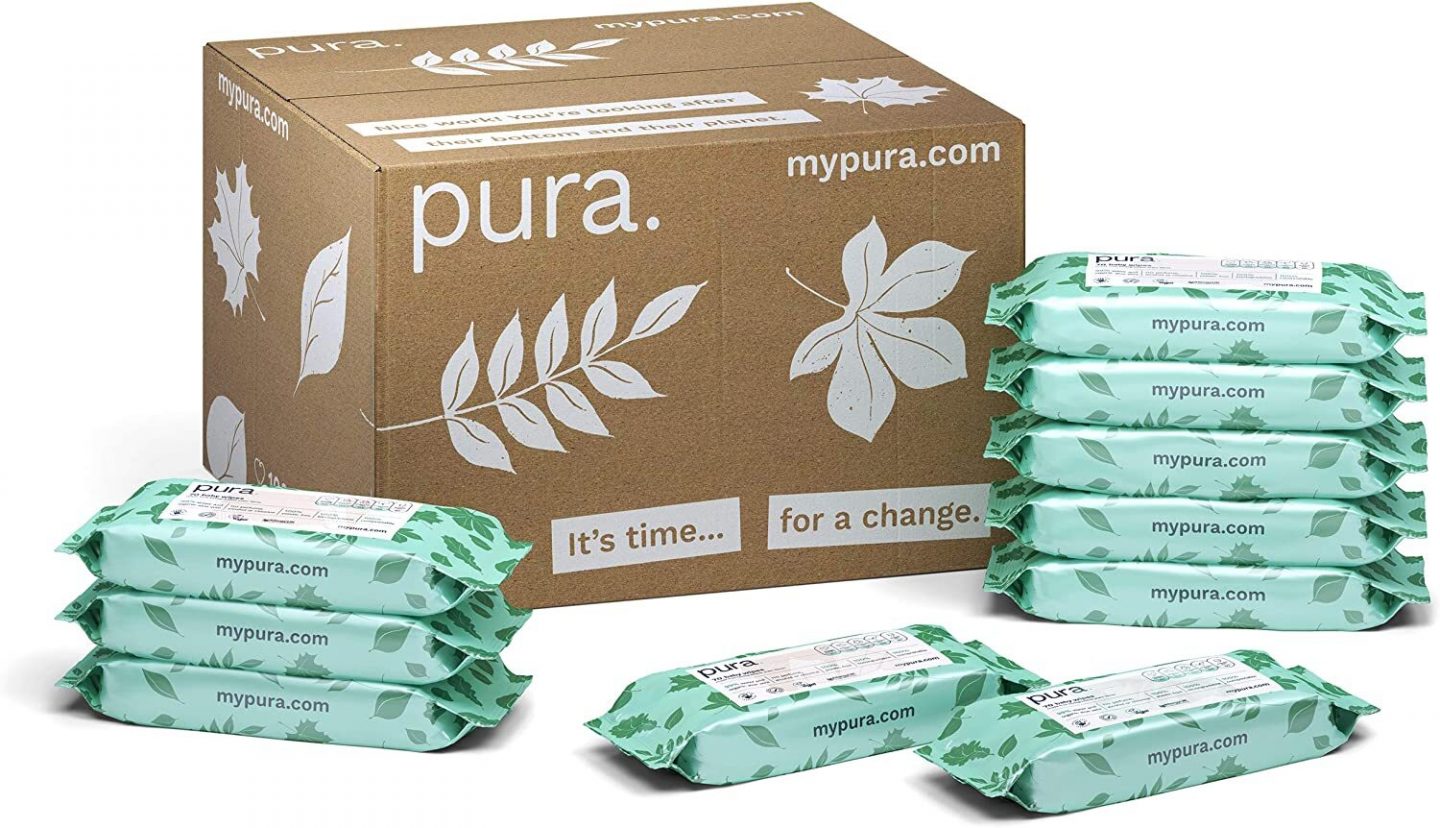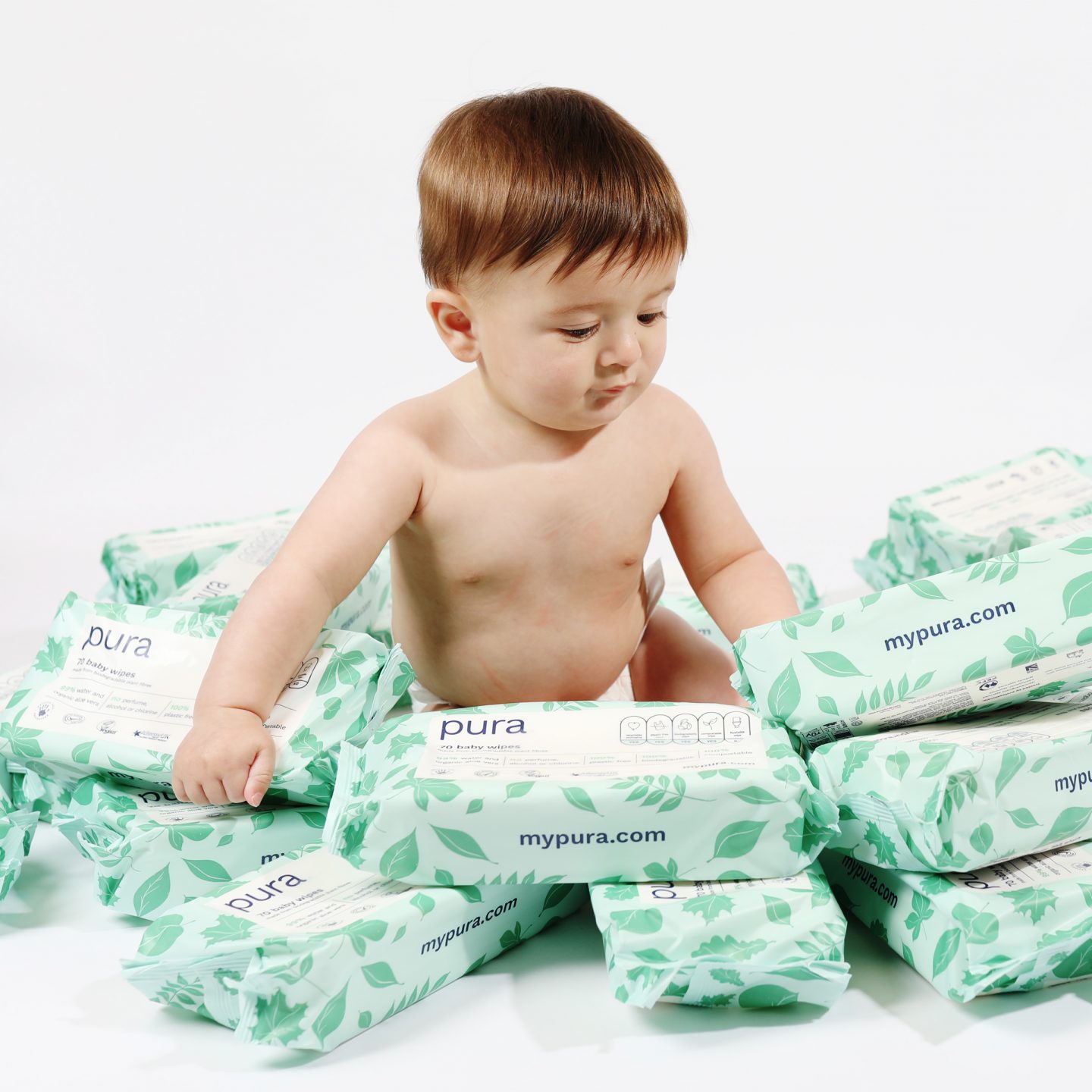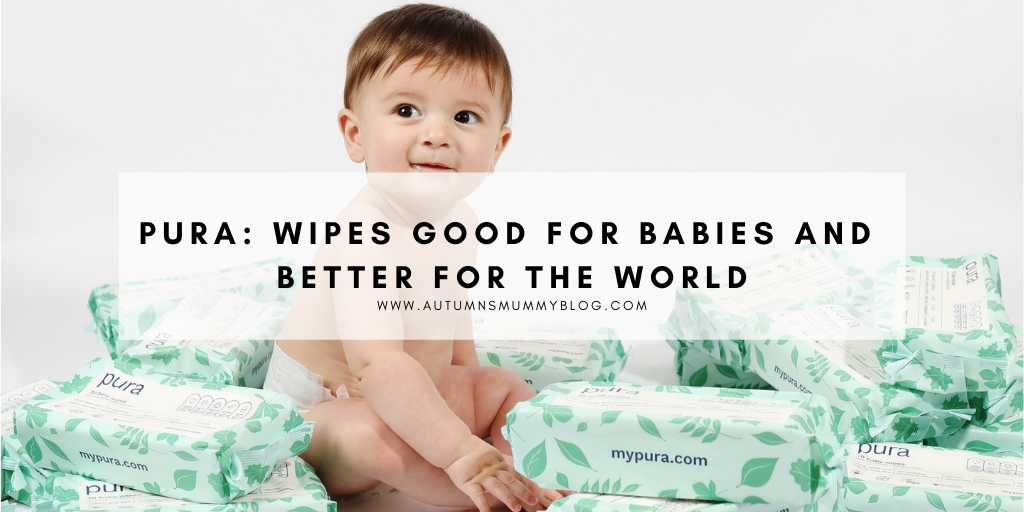Plastic has been in the media a lot over the last few years. The sheer amount that we use and its devastating effects on the planet have constantly been highlighted. So why is it that 90% of the 11 million baby wipes we use in the UK each year still contain plastic? They’re the 3rd most common marine litter item and one of the main contributors to fatbergs. Yuck! One company trying to tackle the issue and create change in a purse friendly and practical way is Pura. They were founded by husband and wife team Guy and Abi Fennell and launched last year. Last week I had the pleasure of interviewing their Chief Marketing Officer Amanda Richards to find out more.
Plastic usage is something that people have become so much more conscious of over the last few years. I’ve been trying to drop as much single use plastic as I can over the last 3 or 4 years. I was quite shocked to see that 90% of baby wipes on the market still have plastic in!
It’s scary and it’s actually something that not very many people know at all. It’s what inspired Guy to start his business and start to make a change. In fact, I met him and we were talking about this opportunity to launch this baby brand . We were sat over a coffee in London and he said “Did you know that 90% of baby wipes in the UK contain plastic?” and I was like “What?!” I genuinely had no idea. It’s been years since I’ve changed nappies, but baby wipes feel perhaps cotton or paper based. I had no idea they were made from plastic and very very few people do. That’s obviously one of the big things we’re trying to change because you can’t live a less plastic heavy life unless you know where the plastic is that you’re using. Things like bottles and food packaging is obvious, but there is so much hidden plastic in what we use.
I mostly use cloth nappies and reusable wipes on my son. Sometimes it is practical to have that packet of baby wipes too though, especially if someone else is looking after your child for the day and perhaps doesn’t know what to do with reusables or isn’t fully behind the idea.
It all comes down to convenience. We wanted to find a solution for busy young parents. Some of them might mix it up like yourself, but not everyone is willing to try alternatives. We wanted to tackle what most parents do today and find a biodegradable alternative.
We’ve already touched a little on the start of Pura. When did it all begin?
Guy started thinking about Pura about 3 years ago. He and his wife Abi were at the point where they wanted to start a family and lots of friends had babies around that time too. He noticed how many wipes there were everywhere; in the kitchen, bathroom, car, pushchair and even in the dog bed! He’s an entrepreneur by heart and thought there must be a massive market for this. When he started digging into it more, he found that a majority of these wipes being sold contained plastic and wanted to bring about a change. We’ve been working together since 2019 to bring this product to life. The official launch was Father’s Day, 21st June 2020. So we’re a brand that launched during lockdown!

The Pura website has ‘most accredited babycare brand’ very proudly emblazoned across the top of the homepage. Could you tell me a little bit more about that?
Parents are looking for something that is good for their baby’s skin, so when we were developing the product and taking it to the manufacturer we really thought about all of the important accreditations from a skin perspective. Every baby’s skin is different, so can we make it suitable for sensitive skin, eczema prone skin and newborn skin? So we made sure all of that testing was done. We wanted to make sure that it would be good for children for allergies and worked with Allergy UK to secure that accreditation. The British Skin Foundation was another important one. Equally, we wanted to be an eco-friendly baby care brand, so there was a lot of focus on the environmental impact of the product. We have accreditations such as the Soil Association, Cosmos Natural, we’re vegan approved and there’s no cruelty to animals. Also, sustainable sources. Our plastic-free wipes are made from biodegradable plant fibres from a sustainable source. All the accreditations are all quite genuinely different. Some brands have lots of accreditations that are doing the same thing. We don’t want to mislead the consumer or greenwash.
Pura was inspired by the sheer amount of baby wipes being used by friends with children. What was it that made Guy realise it was him personally that needed to take this issue?
Partially the scale of the issue – realising that 90% of wipes made are plastic and that basically nobody knows that. He was in a mindset of wanting to start a family and that changes your outlook on things. You start to think about the kind of planet you’re going to leave behind for your own children and he was driven by that too. Not everyone is able to create awareness of a problem and bring a solution to the market, but he is quite entrepreneurial in spirit and surrounded himself with people he needed to make this a reality.
One of the problems with plastic is the amount of time it takes to break down. How long do Pura wipes take to break down?
Weeks or months, compared to the hundreds of years that plastic wipes will hang around for. When they do break down, they don’t leave any microplastics around. A plastic wipe will even after hundreds of years and is an ongoing problem. The environment will make a difference, of course. In an industrial composter, it will take less than 12 weeks but in a landfill environment it will take longer and will depend on what it’s around.
Are Pura wipes something we can put in our compost bin at home?
They are certified by TUV Austria; anything that is home compostable has to carry their logo on it. This means that the wipes have been tested by an independent third party and they are confirmed to be suitable for home composting. You can absolutely put Pura wipes in your home compost bin – we don’t recommend heavily soiled wipes covered in poo etcetera in there, but perhaps ones which have been used for a wet nappy or wiping faces.
If 90% of baby wipes on the market, that means there are around 10% that already are plastic-free. What sets Pura apart from those other brands?
We want to make eco easy and affordable for parents. When parents become aware there is this issue with plastic wipes, they want an eco alternative that is really good quality and does a great job. But they also don’t want to pay more for it. Traditionally, eco-friendly products come with a higher price tag. As a brand, we think “Why should you pay more to do the right thing by your baby and the planet?” We are the largest wipe on the area in terms of surface area which means that not only is the wipe easier to use, you use less of them. It takes longer to get through the pack which is better for the environment. They’re made in the UK, but a lot of eco alternatives are made in China and shipped over. Our packaging is quite bold and disruptive and the way we use babies in our adverts to talk angrily is different.
Along with being competitive in price and the convenience of the wipes, hopefully this will help plastic-free to become the norm.
They are convenient and accessible; we’re primarily online but are extending into retail. We’re on Amazon and have just launched on Ocado, but if you sign up for a subscription on our website you can get them even cheaper. You can get 20% off by signing up for one and it’s really easy to manage. There are no strings attached, if you want to pause it there’s no issue there. You can set how often you want it based on your own needs. It’s one less thing to think about and you get free next day delivery too every day of the week so it’s really practical for parents.

With 90% of wipes on the market being plastic, how can people tell if they’re buying ones with plastic or not? I had a look at some baby wipes I had in the cupboard and had a look and just couldn’t tell from the ingredients or packets.
It’s very hard to tell because companies are not legally required currently to talk about what the actual wipe is made from. The ingredients list on a packet will only talk about the lotion that goes onto the wipe to keep it moist and make it clean. Because they’re not obliged to tell, they don’t want to. What you need to look out for is “plastic-free” or “biodegradable”. It’s also a bit harder because some brands talk about being made with plant fibres, meaning that they’re made with some plant fibres but there’s still a lot of plastic in them. That’s hugely misleading to consumers. As a brand we want to raise awareness of how many wipes contain plastic and offer an alternative.
Pura wipes are biodegradable, compostable, plastic-free, made in Britain, vegan, not tested on animals and suitable for those with sensitive skin and eczema, with lots of accreditations to boot. Would you say you have achieved THE perfect baby wipe?
The product is absolutely fantastic and I’ve used it myself. I really like using them and our customers really like using them. We have a lot of Trust Pilot reviews and an excellent Trust Pilot rating. Mums and Dads give us good feedback on how it’s really good for their babies skin and how they had eczema before and the wipes have really helped with that. They love the size, the softness and how they’re good for different jobs. A problem with all wipes is that they’re not always easy to get out of the pack; that’s a problem we want to fix. The packaging the wipes come in is recyclable, but it isn’t plastic-free. We can’t really say we’re perfect until it is! The technology doesn’t really exist today to make the perfect packaging though, because it needs to keep the moisture in.
It sounds like you’re doing the best with what is currently available to you. You’re currently campaigning for the government to ban plastic in baby wipes. Why is it so crucial that we get them to do this?
A few years back things like plastic straws, stirrers and cotton buds were taken off of the market by something called the Single Use Plastics Directive. This ban itself came into force in Oct 2020 but the SUP initiated this change a few years back. In our view, the government should have moved in on wipes then. The reason they didn’t was because there wasn’t deemed to be enough available alternatives on the market. But today there’s lots of brands bringing plastic-free wipes to market and there are lots of brands and retailers making it more affordable. Now there’s really no excuse not to ban them because there is an alternative that is affordable and does do just as good a job. It’s so crucial because the plastic wipes take hundreds of years to biodegrade and leave microplastics behind.
(You can sign the petition on the UK Government’s website)
What made you and Guy venture into nappies as well?
We’re trying to tackle the same kind of environmental damage that wipes cause with nappies as well. In the UK in a single year, 3 billion nappies end up in landfill. All disposable nappies are made with plastic in order for them to be able to do the job they need to do in terms of keeping everything in. What we’ve tried to do is to create a nappy that contains as little plastic as possible, as much renewable material as possible and produce it in a really green factory. There’s an organisation in Wales called NappiCycle. They take all the mess out of the nappies and recycle them to turn them into products such as flooring, notice boards and road surfacing. We’re partnering with him on this to make it a reality across more of the UK.
Where do you see Pura in 5 years time?
We’ve got lots of exciting plans for more products and will hopefully have a place on retail shelves including in supermarkets alongside some of the big brands you see there today.
To what do you attribute Pura’s success so far?
Definitely Guy. He’s so driven to make a genuine change.
What does a typical day look like for you?
In a start up, there is no typical day really! We can be in meetings or bouncing product ideas off of each other or doing interviews with people like you. A lot of us are working from home still at the moment, but we might be meeting up to do something like a litter pick. It’s really varied.
Look how much litter we collected at New Brighton beach in The Wirral! A job well done for the Pura team. We’re already planning to return to help keep our local beaches clean and green next month. #beachcleanup pic.twitter.com/iKYzCj4Bpj
— Pura (@mypura) April 30, 2021
Since Pura started, Guy has had a little boy called Ezra. Could you tell me a little more about him?
He was born in March last year, just before the first lockdown so he’s about 14 months old now. He’s very sweet.
Do you think having Ezra in his life has impacted how Guy sees Pura and your mission as a business?
I don’t think so, because it was very important to him and he was very driven anyway. If anything, Ezra has made him even more driven.
Disclosure: I have been sent some samples in exchange for doing this interview. However, all views and opinions are as always honest and my own. I was genuinely intrigued by this company and its products and wanted to bring it to the attention of my audience as I am concerned about the issue of microplastics and want to help parents to reduce their plastic use in an achievable way for them.
